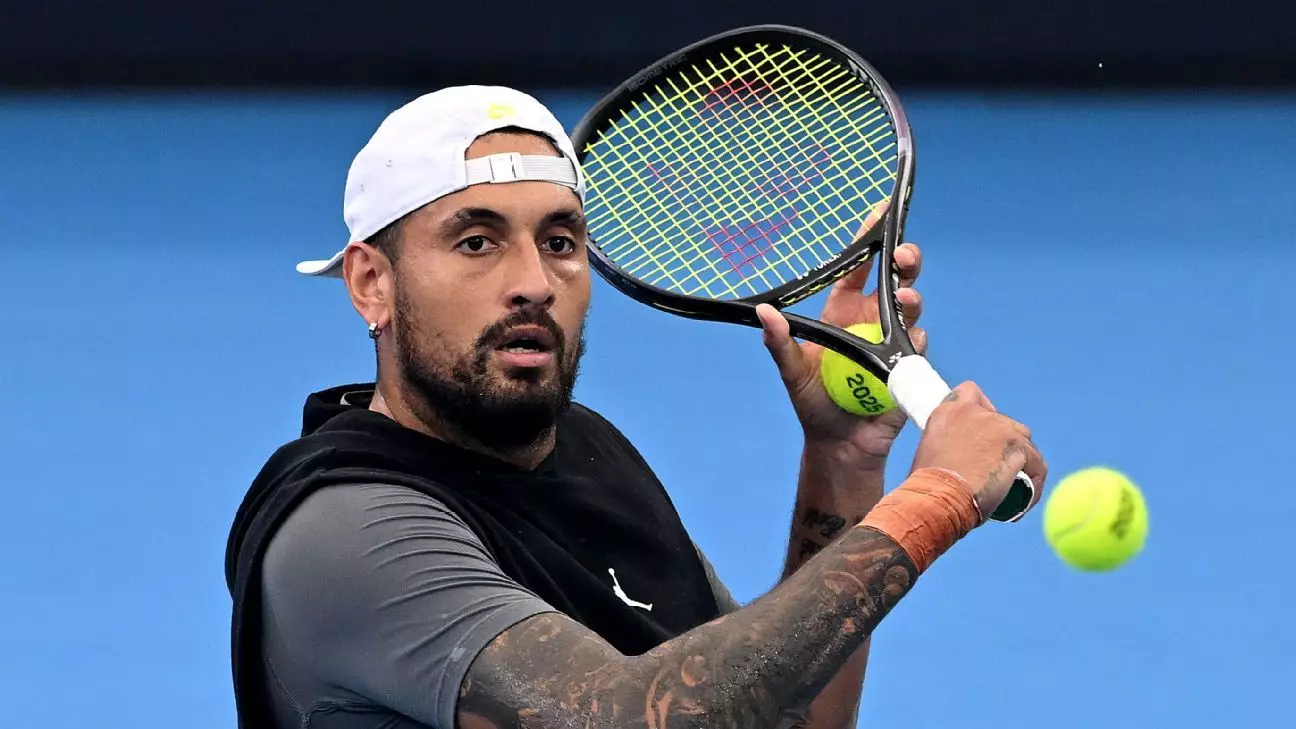Tennis has always been as much about the players themselves as it has been about the matches on the court. Among the contemporary stars, few evoke as strong a mix of adoration and disdain as Australia’s Nick Kyrgios. As he prepares to re-enter the Grand Slam arena at the Australian Open, the discourse surrounding his character and its implications for the sport is more pertinent than ever. Whether one is a fan or a critic, the consensus is clear: Kyrgios’s return holds the potential to invigorate the tennis world.
At the heart of Kyrgios’s appeal lies his magnetic persona. He embodies the dramatic flair akin to theater—whether through his outlandish on-court antics or his pointed remarks off the court, every moment is charged with uncertainty. “We watch sport because we want personalities,” Kyrgios stated, emphasizing the necessity for intrigue in competitive settings. This sentiment highlights a growing trend in sports, where followers yearn for more than just athletic prowess; they crave emotional engagement and stories that transcend the surface level. For Kyrgios, stepping onto the court is an unpredictable affair, and this unpredictability is what ensures that viewers remain glued to their screens.
Kyrgios has consistently polarized opinions. His strokes are aggressive, his serves powerful, but it’s his flair for the dramatic— the between-the-legs shots and heated exchanges with umpires—that captivates audiences. Yet, his journey has not been devoid of turbulence. Past controversies—including legal issues stemming from personal disputes—have plagued his career, contributing to his reputation as one of tennis’s most unpredictable figures. This complexity makes him a riveting character in a sport that often leans more towards tradition and decorum.
Kyrgios himself claims that the sport was becoming increasingly “mundane,” suggesting that his return is not merely a personal triumph but a potential renaissance for tennis. In an age where calculated performances dominate, his impassioned play and provocative presence are a refreshing deviation from the norm. The candid nature of his commentary—sometimes inflammatory, often insightful—invites discussions that transcend mere match scores. His willingness to tackle uncomfortable topics, like doping allegations involving fellow athletes, illustrates that he is unafraid to challenge the status quo.
Kyrgios’s perspective raises an essential question: Can an individual’s persona alter the dynamics of a sport? The answer may well depend on the athlete’s ability to engage a broader audience. His ability to draw young spectators is particularly noteworthy, bridging the generational divide in tennis followers. The influx of youthful interest is vital for the game’s sustainability, and Kyrgios may serve as a pivotal figure in attracting this demographic.
However, the conversation surrounding Kyrgios cannot overlook his physical challenges. With a recent history of knee and wrist injuries, questions linger about his readiness to reclaim his place among the sport’s elite. Having participated in limited competitive matches, isolation from the top level has posed challenges not just for Kyrgios, but for those who follow his journey. He acknowledges these hurdles while expressing optimism: “I think it’s good to be back,” he noted, hinting at both a personal and professional revival.
His recent foray into doubles alongside legends like Novak Djokovic showcases resilience, but one must consider whether his dynamic playing style can withstand the rigors of a Grand Slam format. Would a healthy Kyrgios be a title contender? Opinions among peers, like that of Daniil Medvedev, suggest that in top form, he could rival the best—demonstrating that talent, when combined with a resilient spirit, can produce compelling storylines in tennis competitions.
The Bottom Line: Divine Chaos or Necessary Eccentricity?
As the Australian Open approaches, the spotlight will invariably shine on Kyrgios. His oscillation between hero and anti-hero captures the essence of competitive sport—a stage for wild drama, complex narratives, and unfiltered human emotion. Regardless of one’s stance on his antics, Kyrgios undeniably adds an electric charge to the game, compelling fans and critics to engage in a dialogue as rich and detailed as his playing style. In a world enamored with perfection, the chaotic energy of Nick Kyrgios serves a greater purpose: reminding us that sport, at its core, is as much about storytelling as it is about athleticism. As his anticipated return draws near, one can’t help but wonder: What will the enigma of Nick Kyrgios unveil this time?


Leave a Reply